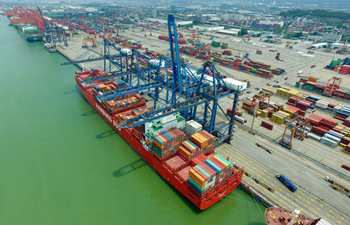By Eric J. Lyman
TAORMINA, Italy, May 27 (Xinhua) -- The final communique released Saturday after a the Group of Seven (G7) countries summit gave its backing to the 2015 Paris Agreement on climate change -- with the conspicuous exception of the United States, which said it would take more time to make a decision.
The backing of the Paris Agreement goals from Canada, France, Germany, Italy, Japan, and Britain is not a surprise.
The delay from the U.S. is being seen as an area for concern for advocates of international action to confront climate change.
The U.S. had crippled the 1997 Kyoto Protocol, the predecessor to the Paris Agreement, when it refused to ratify it. The U.S. is the world's second leading producer of greenhouse gasses and the largest single contributor to the United Nations budget for climate action.
Formally, the communique says the U.S. is "in the process of reviewing its policies on climate change and on the Paris Agreement", while the other six countries affirmed a "strong commitment" to the Paris deal.
The split statement like the one on climate is an unusual development at the G-7, which usually seeks to provide a united front on the issues it addresses.
"It's not a small difference, but six of seven countries agree on climate action and the U.S. is still in a phase of revision I hope will conclude soon," Paolo Gentiloni, Prime Minister for host Italy, said in a press briefing.
Concrete news of the U.S. stance could come quickly -- U.S. President Donald Trump used social media on Saturday to indicate he would make his decision on the Paris deal "next week".
Trump's predecessor, Barack Obama, negotiated the deal and agreed reduce the country's emissions by between 26 and 28 percent by 2025 compared to 2005 levels.
There was widespread speculation in Taormina that Trump will ultimately agree to the Paris Agreement but only under specific conditions.
"I think Trump will ultimately agree to remain part of the Paris Agreement, but he will want to present it as a victory and so he will probably demand other countries make some concessions on rules or funding or emissions reduction goals of something like that," John Kirton, director of the G-7 Research Group at the University of Toronto, told Xinhua.
Environmental groups were critical of the U.S. stance and praise for the other six countries to stand by their stances on the Paris deal.
Trump "is isolating the U.S. from its most important allies and those allies stood strong in the face of backsliding," Heather Coleman, climate director at Oxfam America, said in a statement referring to the Paris Agreement policy of not weakening climate-related commitments over time.
Alden Meyer, director of strategy and policy for the Union of Concerned Scientists, agreed.
"The leaders from Europe, Canada, and Japan have made it crystal clear that they intend to fully implement their national commitments under the Paris Agreement, and to pursue efforts to decarbonize the global economy," Meyer said.
"Hundreds of U.S. states, cities, and companies are also moving forward on climate action. President Trump should join these leaders in protecting Americans from the mounting impacts of climate change and reaping the economic benefits of the clean energy revolution," Meyer said.
In a statement, Gary Cohn, one of Trump's senior economic advisors, said the talks in Taormina were having an impact on the U.S. president.
"I think he's leaning to understand the European position," Cohn said. "He knows that Paris (deal) has important meaning to many of the European leaders. And he wants to clearly hear what the European leaders have to say." Endiem















